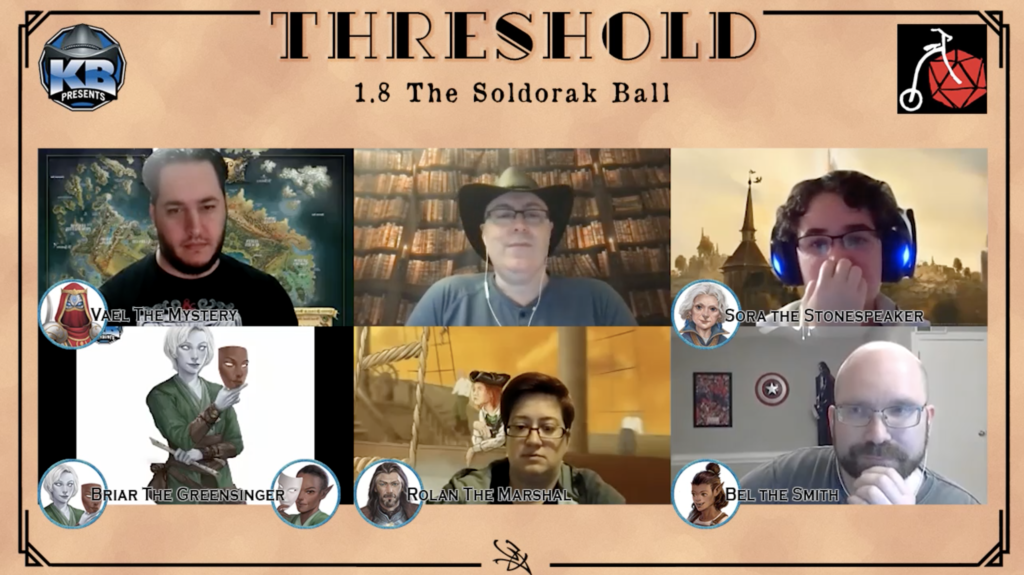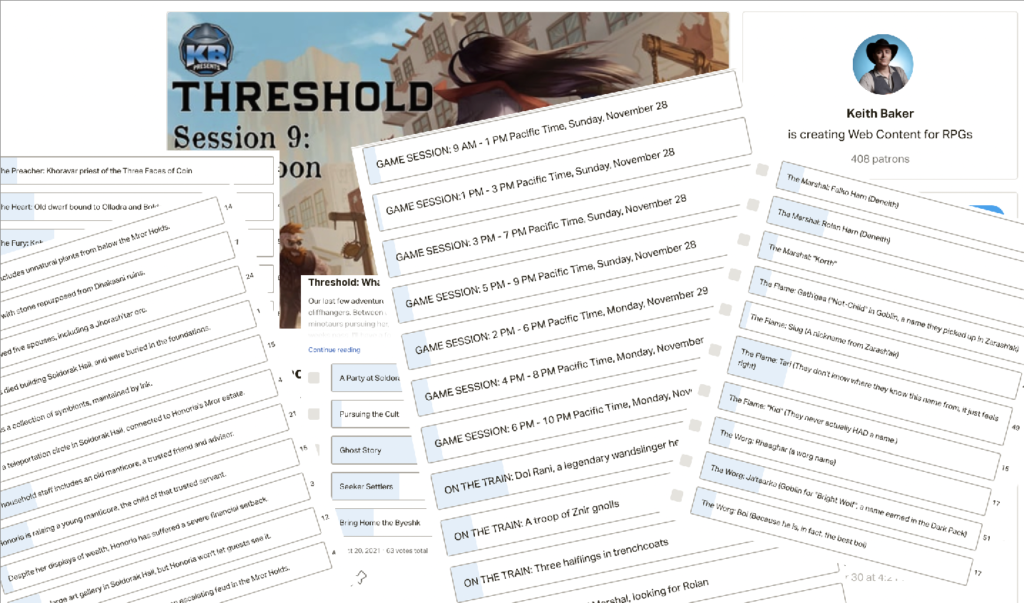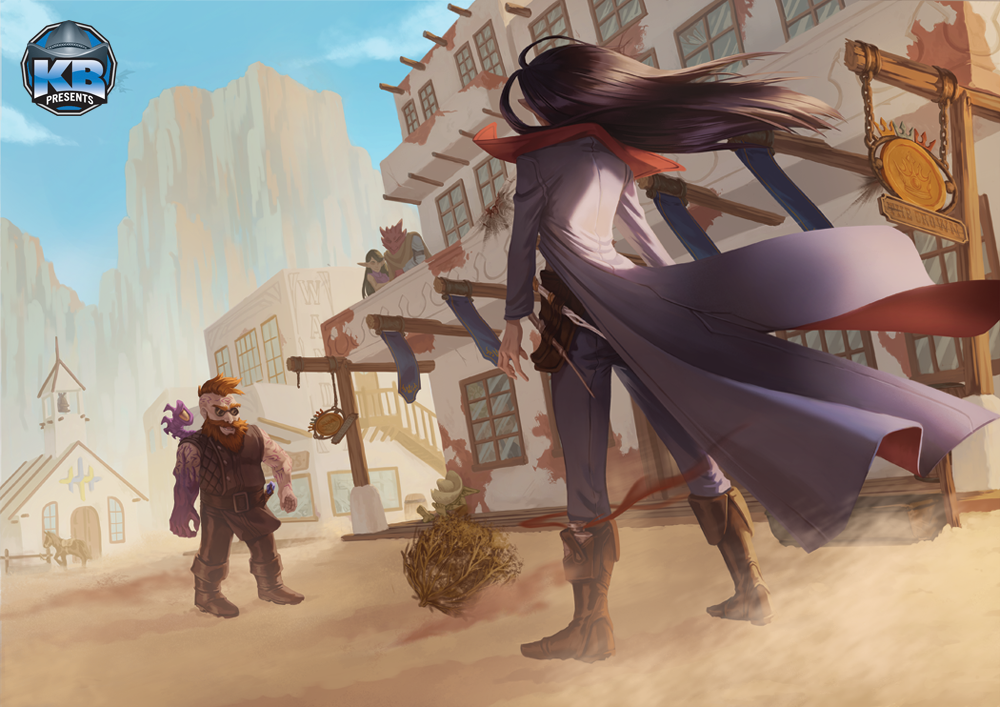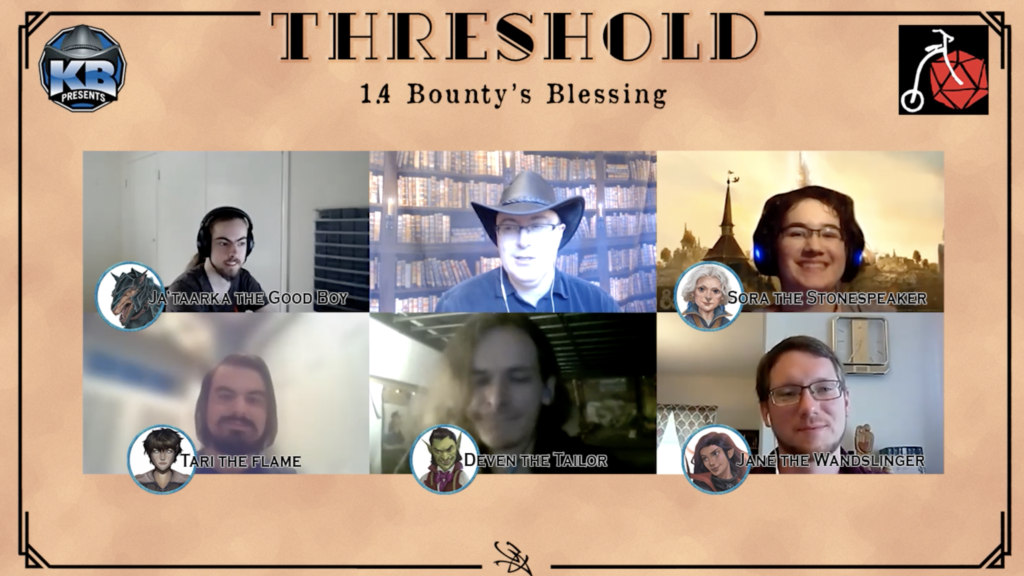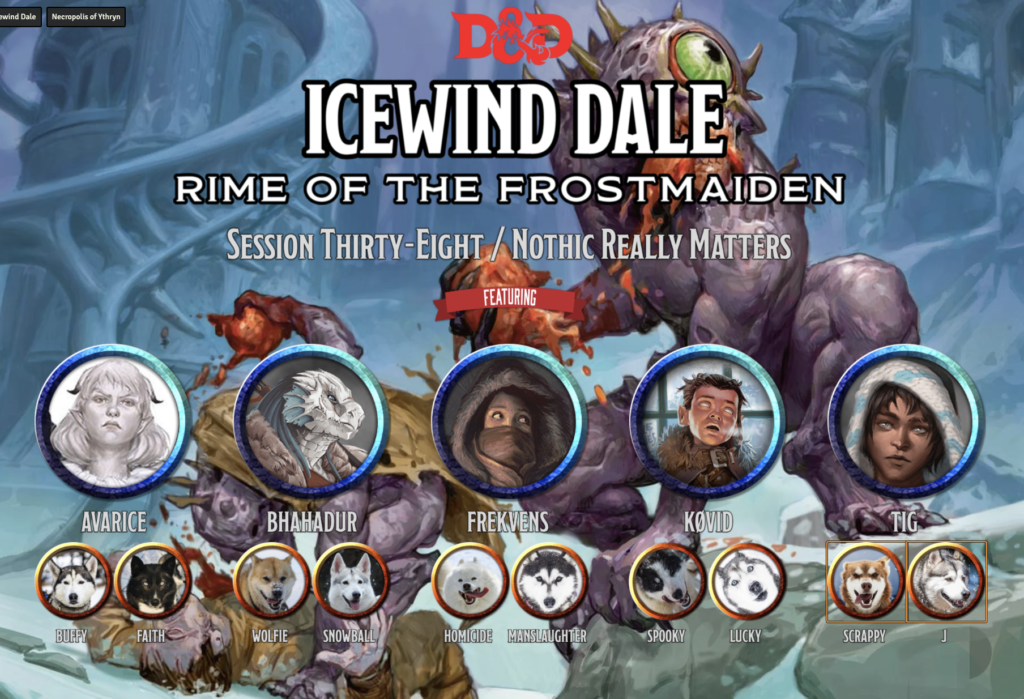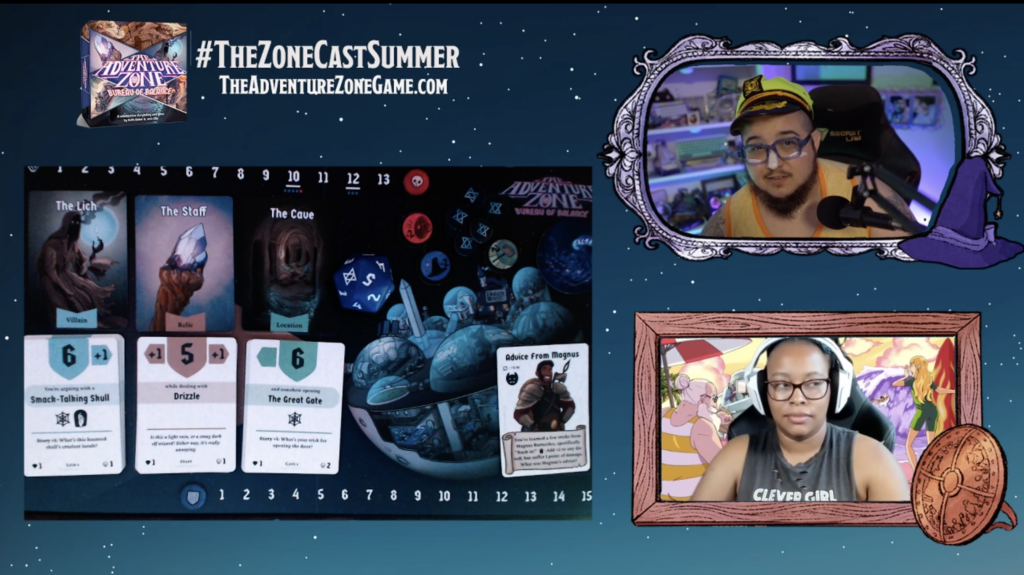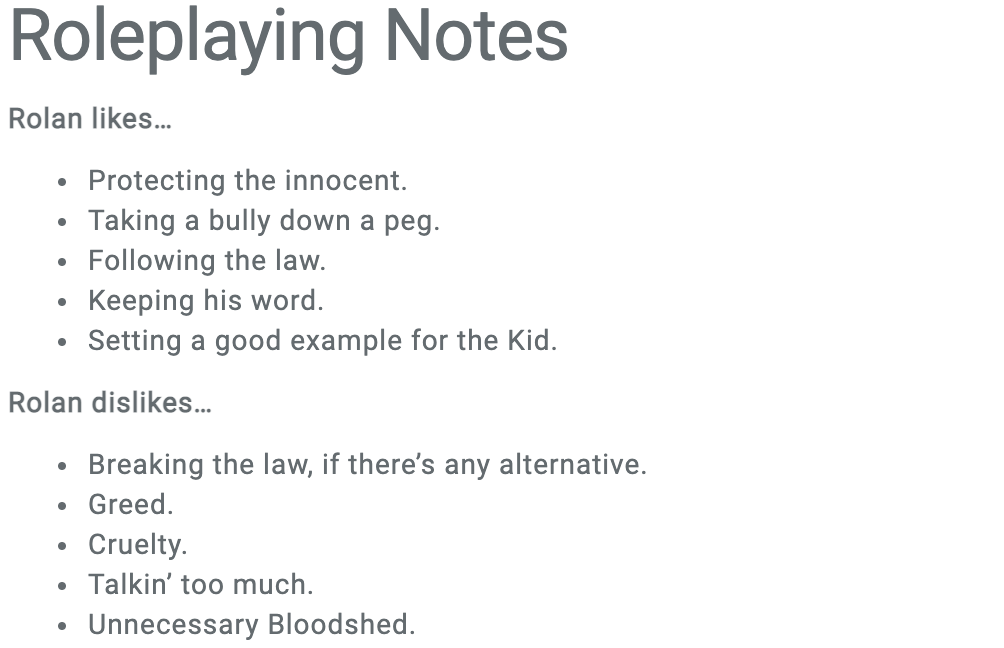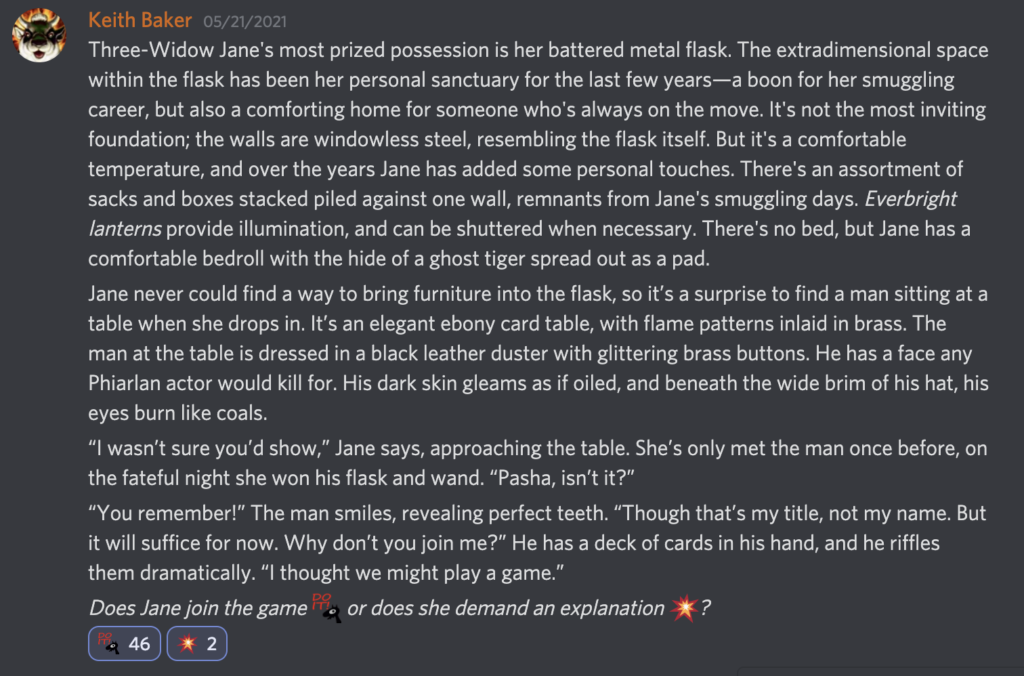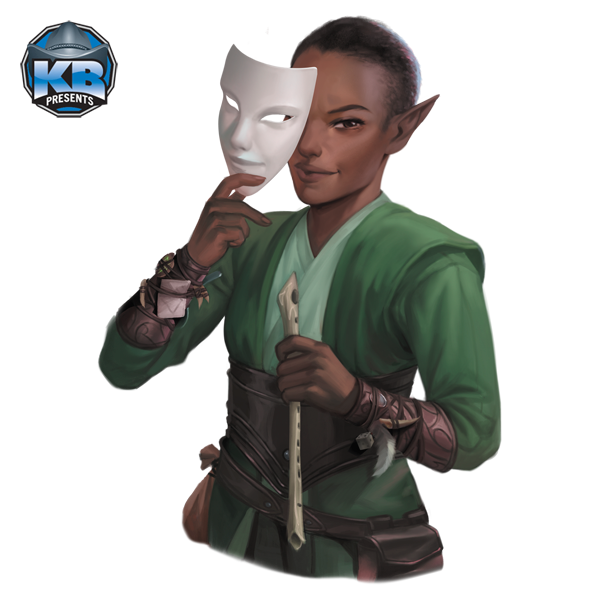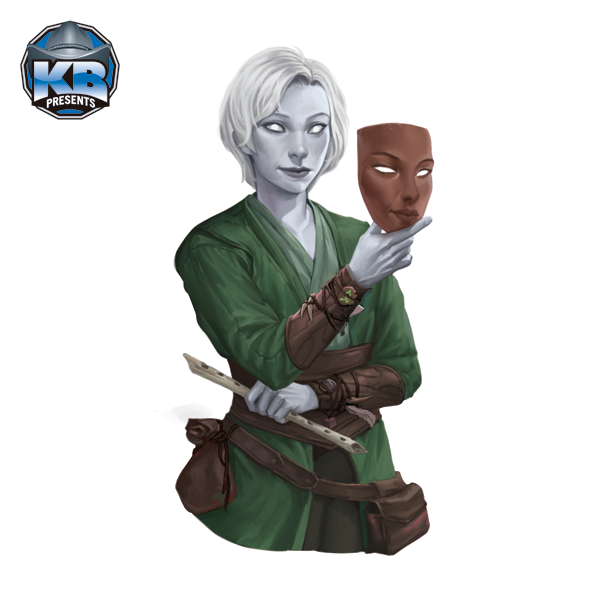As time permits, I like to answer interesting questions posed by my Patreon supporters. Often those questions are tied to Eberron, but sometimes there’s a more general topic. Case in point…
As a world builder myself and a long time improviser, making things up on the fly to adapt to situations is the environment I *live* for and it’s made my storytelling in this game really step up. I’m writing more than I’ve ever written before in order to keep up with my players story as well as be a few steps ahead. While I know it can be a matter of taste, which do you like to do more as a DM; prepare for the most likely situations but expect the unexpected or completely roll with the punches because you’re so familiar with the world you’ve created?
I love the collaborative element of TTRPGs. I may know all the secrets and where the action will go, but I love that I don’t know which hooks the adventurers will latch onto. I have an adventure that I’ve run almost sixty times, and it’s still fun for me to run again because there’s always something that comes up in each session that I’ve never seen before. I love to see players come up with creative solutions to problems, and I’m always going to encourage that, because that’s what makes it interesting for me; if they followed an entirely predictable path, if I knew exactly how the story was going to end, it wouldn’t be that interesting to run it twice, let alone sixty times.
With that said, fun fact: I’ve never published that adventure I’ve run sixty times, because I’ve never written it down in such a way that anyone else could run it. The adventure is set in the city of Graywall, which I know like the back of my hand. The adventurers are trying to locate a fugitive. Because I know the city so well, I don’t have to have every option written down. If the adventurers say “We want to talk to a Brelish expatriate” or “Who sells refined dragonshards in bulk?” I know the answers to those questions, and I can freestyle a quick encounter with the Tharashk shard salesman. However, I also have a few anchor points that I know the adventure will hit. Whatever path they take to get there, I know the adventurers will have to deal with at least two of three specific people/places… and I know where the fugitive is and what they will find when they get there. So I have those four scenes prepared ahead of time—with statistics for the combat encounters, traps and treasures, and the like. But I never know which three of these four scenes I’ll use in a particular run of the game.
The same thing is true when I’m running my Patreon campaign on Threshold. In session 2, the adventurers were investigating the disappearance of local kobolds. I knew where they would end up—that they’d need to investigate the farmstead of Kaine Agran, and that doing so would lead them to a sinister chamber of skulls hidden in the mountains. I had both of those scenes plotted out, complete with statistics for the threats they would face. But I didn’t know how they would GET to the farmstead. And case in point, when I ran the adventure twice, one group of players focused on dealing with the Brelish veterans in town, while the other group centered their investigation on the kobold community. But I knew that both of those were options, and I knew that I could improvise a scene in either direction—because I had an established cast on NPCs in each location and generally knew how they could help.
Meanwhile, the fourth Threshold session—the first hour of which is available here—was set at a festival. I had five specific scenes planned at the festival—Kobolds dancing around a fruit idol; a tiefling missionary approaches one of the characters; an illusionary shooting gallery; a baking contest; and an unexpected confrontation at the final feast. But I didn’t know which of these would catch the players’ interest or how long each might take; they could have just shurgged and walked by the fruity kobolds, or they could join in the ceremony (which they did). So I had a handful of established NPCs there at the festival I was prepared to deploy. The adventurers could have been approached by the priest who was organizing the festival, or caught up in a drunken brawl; I knew I could fill space if I needed to. And taking the shooting gallery—the structure was that the PC wandslinger had to face five illusionary opponents. I had each of the other players describe one of these illusionary opponents—so even though it was a scene revolving around a single PC, each player got to be involved—and then when it got to the fifth opponent I revealed it to be an ambush by a gang of halfling hitmen (a combat which then involved everyone). The main point is that I’d planned how the scene would end—I had stats for the squad of halfling hitmen—but I didn’t know what the players would come up with for the four first targets, and it was fun for me to see what they thought up.
So MY preferred style is to work within an area that has some flexibility, with a number of concrete scenes or locations that drive the story and that I know will be involved: I know that sooner or later the adventurers will get to the Chamber of Skulls, or they will get to the confrontation at the final feast. But I’m prepared for them to take an unexpected path to reach that point, because I know the cast and locations around them and I can improvise secondary scenes. This doesn’t work with every story; if I’m doing a serious dungeon crawl where resources are limited and the players’ choice of which rooms to explore matters, I’m going to carefully map it out ahead of time. If the adventurers are going to a new location where I don’t have a well-established supporting cast to fall back on, I’ll plan things more carefully. But I personally like the middle ground—not planning every detail or leaving everything to chance, but building an adventure around a few scenes I know will occur, with flexibility to improvise around them.
How do you handle times when the players bring about a situation that you really ought to know how to handle, but in the heat of the moment can’t imagine what to do next?
I try not to be caught in this situation. While I don’t plan for every contingency, I do prepare notes ahead of time and think about characters and locations that might turn up—for example, the idea that a drunken brawl at the festival would be a simple way to fill a hole if the players moved too swiftly through the content I’d prepared. But while I do my best, it’s impossible to prepare for every contingency. Sometimes a player asks a question you just don’t know the answer to—”This is a textile factory, right? Are they doing mule spinning or ring spinning?“—while other times you may just have had a long day and find yourself out of ideas. When I do find myself in that situation, my standard approach is ask the players for the answer. First of all, in the case of the person asking about an obscure subject, given that they asked the question they probably know what they WANT the answer to be. I don’t know the difference between mule spinning and ring spinning, but THEY do, an d this gives them an opportunity to educate the group and the answer that they think makes sense. And beyond this, at the end of the day, it’s a collaborative story. Perhaps the players are in a stagecoach and it gets blown off a bridge, and you suddenly realize you have no idea how they’re going to survive. Turn it to them: How are you going to survive this? Depending on the situation, this could be a metagame discussion, where you freeze the action and talk to the PLAYERS—”How do we get out of this mess?” On the other hand, I could also present it as a simple skill check to players. “You’re going to take 50 points of damage when the coach strikes the bottom of the ravine. What do you do to survive this?” I’d evaluate their answer and either have them make a skill check (reducing the damage taken by the result of the skill check, or perhaps by double the result for a great idea) or assign an arbitrary value to an interesting, non-skill based idea. The main point is that ideally, what everyone in the group wants is a satisfying story; there’s nothing wrong with occasionally asking the players to fill in the blanks. Looking back to the textile question, I could go research textile factories to find out a good answer—but if the player already has that expertise and knows what the smart answer would be, why not use that expertise?
If you have questions about this approach or want to share how YOU do things, add your comments below! Thanks as always to my Patreon supporters for making these articles possible.





 Unlock with Patreon
Unlock with Patreon